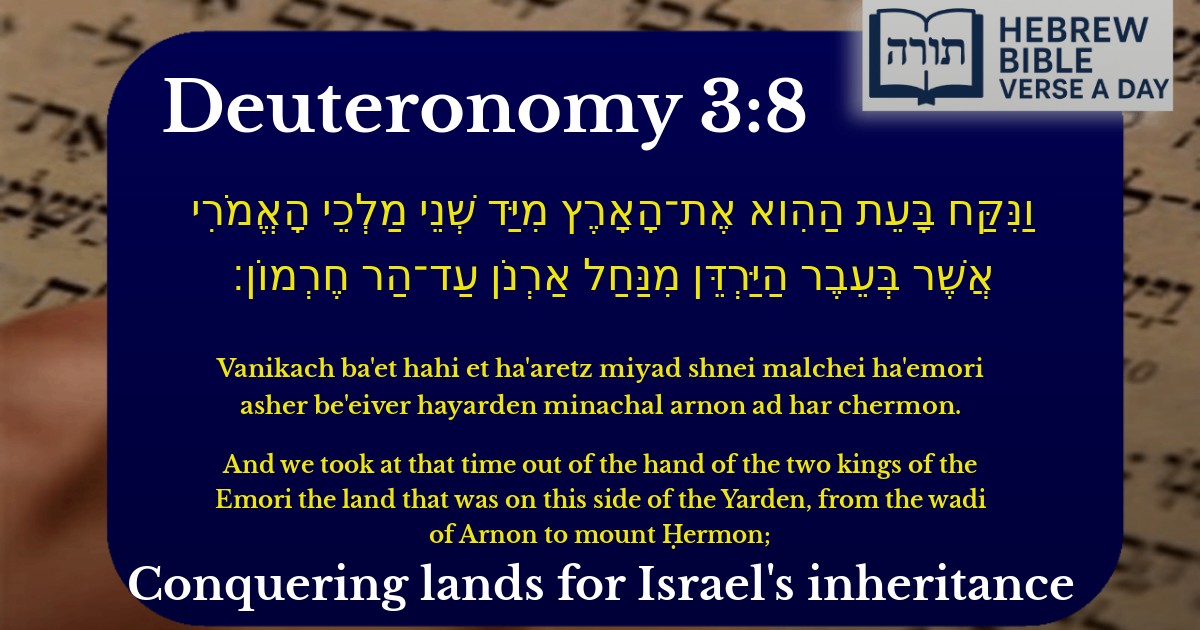Join Our Newsletter To Be Informed When New Videos Are Posted
Join the thousands of fellow Studends who rely on our videos to learn how to read the bible in Hebrew for free!
Hebrew Text
וַנִּקַּח בָּעֵת הַהִוא אֶת־הָאָרֶץ מִיַּד שְׁנֵי מַלְכֵי הָאֱמֹרִי אֲשֶׁר בְּעֵבֶר הַיַּרְדֵּן מִנַּחַל אַרְנֹן עַד־הַר חֶרְמוֹן׃
English Translation
And we took at that time out of the hand of the two kings of the Emori the land that was on this side of the Yarden, from the wadi of Arnon to mount Ḥermon;
Transliteration
Vanikach ba'et hahi et ha'aretz miyad shnei malchei ha'emori asher be'eiver hayarden minachal arnon ad har chermon.
Hebrew Leining Text
וַנִּקַּ֞ח בָּעֵ֤ת הַהִוא֙ אֶת־הָאָ֔רֶץ מִיַּ֗ד שְׁנֵי֙ מַלְכֵ֣י הָאֱמֹרִ֔י אֲשֶׁ֖ר בְּעֵ֣בֶר הַיַּרְדֵּ֑ן מִנַּ֥חַל אַרְנֹ֖ן עַד־הַ֥ר חֶרְמֽוֹן׃
וַנִּקַּ֞ח בָּעֵ֤ת הַהִוא֙ אֶת־הָאָ֔רֶץ מִיַּ֗ד שְׁנֵי֙ מַלְכֵ֣י הָאֱמֹרִ֔י אֲשֶׁ֖ר בְּעֵ֣בֶר הַיַּרְדֵּ֑ן מִנַּ֥חַל אַרְנֹ֖ן עַד־הַ֥ר חֶרְמֽוֹן׃
🎵 Listen to leining
Parasha Commentary
📚 Talmud Citations
This verse is not quoted in the Talmud.


Context and Overview
This verse (Devarim 3:8) appears in Moshe's recounting of Bnei Yisrael's conquest of the lands east of the Yarden (Jordan River) before entering Eretz Yisrael. The two Amorite kings mentioned are Sichon and Og, whose defeat is described earlier in Bamidbar 21 and Devarim 2-3. The verse emphasizes Hashem's fulfillment of His promise to give the land to Avraham's descendants.
Geographical Significance
Rashi explains that the boundaries mentioned—from the Nachal Arnon (Wadi Arnon) to Har Chermon (Mount Hermon)—represent the full extent of the conquered territory. Nachal Arnon marked the southern border of the Amorite kingdom, while Har Chermon was the northernmost point. The Talmud (Berachos 54b) notes that Har Chermon was so named because it served as a cherem (ban) against the sins of the generation of the Flood, highlighting its spiritual significance.
The Two Kings: Sichon and Og
Spiritual Lessons
The Rambam (Hilchos Melachim 5:1) derives from this conquest that wars for Eretz Yisrael are milchemes mitzvah (obligatory wars), sanctioned by divine command. Additionally, the Sforno notes that mentioning these victories here reinforces the theme of divine providence—Hashem delivered powerful kings into Bnei Yisrael's hands despite their military might.
Historical Continuity
The verse underscores the legitimacy of Bnei Yisrael's claim to the land, as later emphasized in Yehoshua's time. The Daas Zekeinim points out that these victories east of the Yarden foreshadowed the conquest of Canaan, proving that no enemy could withstand Hashem's will.